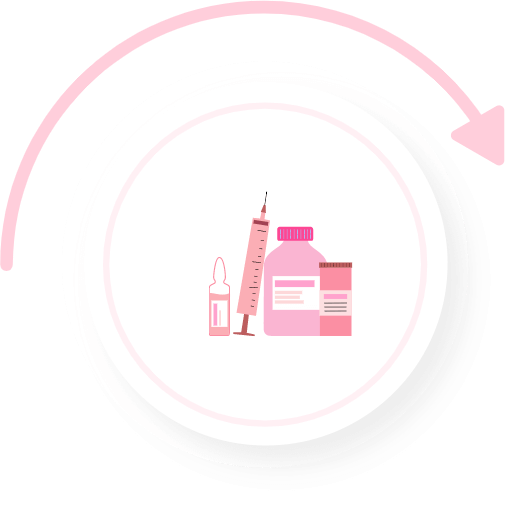In Vitro Fertilization (IVF) is a innovative reproductive technology that offers hope to individuals and couples struggling to conceive. This advanced procedure, referred as a “miracle of science,” allows for the fertilization of eggs and sperm outside the human body. It involves stimulating a woman’s ovaries to produce multiple eggs, retrieving those eggs, fertilizing them with sperm in a laboratory, incubating the resulting embryos, and then transferring one or more healthy embryos back into the woman’s uterus. IVF has transformed the lives of countless families worldwide, providing a path to parenthood for those facing a range of fertility challenges.
In 1986 when Dr. Indira Hinduja and her team at the KEM Hospital in Mumbai delivered a baby through this ground-breaking technique. This progress opened doors for couples facing fertility challenges. Soon, many hospitals and clinics across India adopted IVF methods. India gained a reputation for offering quality fertility treatments at a lower cost. People from different countries started coming to India for these services. IVF continues to be a popular and impactful solution for couples striving to become parents in India.
IVF ‘In-Vitro Fertilization’ here ‘In-Vitro’ means the fertilization happen in the lab environment. It is a process in which retrieved female egg and male sperm comes together to fertilize to form a baby. This baby called as an embryo.
IVF is required when partners are facing difficulty while having babies. It helps when a woman have blocked, damaged, or missed fallopian tubes. or a man’s sperm is not normal. Sometimes, cause is not clear or unexplained and IVF can be a solution.

The woman receives stimulation injections from the second day of her menstrual cycle to boost egg production. Doctors stimulate the ovaries with stimulating injections for about 8 to 12 days. This procedure will increase the chances for successful result.

The doctor takes out eggs from the woman's ovaries. This procedure happens under anaesthesia or sedation, where mature eggs are collected via a minimally invasive procedure. This procedure occurs after completion (14-15 days) of stimulation.

Simultaneously, the sperm sample will be collected. Embryologist check if the sperm is of good quality. Then, they fertilize the egg and sperm for further procedure.

On this step, embryologists injects best quality of sperm in the mature egg for fertilization process. This whole procedure completes under microscope. This procedure will done by using Intra-Cytoplasmic Sperm Injection (ICSI) in few cases.

Fertilized eggs become embryos which are being monitored for around 3-5 days during culture procedure. Here embryologist assess the development and health of the embryos. This procedure done to get high quality of embryos for further transfer.

In embryo transfer, selected one or two high-quality embryos gets transfer into the woman's uterus. This is a quick and anaesthesia-free procedure which takes around 5-10 minutes.

A pregnancy test is done after two weeks of embryo transfer to know the result of the pregnancy. This stage often followed by expectations and excitement.
IVF treatment can be a physically challenging journey. It involves several steps that couples need to prepare for:
1. Medical Tests Couples need to undergo the following tests before the procedure starts:
2. Lifestyle Improvements To improve IVF outcomes, patients should follow these instructions:
1. Tubal Factors: When a woman’s Fallopian tubes are blocked or damaged, interfering with the natural passage of eggs and sperm.
2. Male Factor Infertility: In cases where the male partner’s sperm may have issues with quantity, quality, or motility.
3. Endometriosis: A condition where endometrial tissue grows outside the uterus, which affects fertility.
4. Unexplained Infertility: When the root cause of infertility is not identifiable.
5. LGBTQ+ and Single Parenting: IVF offers options for same-sex couples and single individuals to fulfill their dreams of parenthood.

1. Medical Tests Couples need to undergo the following tests before the procedure starts:
2. Tubal Factors: When a woman’s Fallopian tubes are blocked or damaged, interfering with the natural passage of eggs and sperm.
3. Male Factor Infertility: In cases where the male partner’s sperm may have issues with quantity, quality, or motility.
4. Endometriosis: A condition where endometrial tissue grows outside the uterus, which affects fertility.
5. Unexplained Infertility: When the root cause of infertility is not identifiable.
After transferring the embryo, doctor will advised to rest for the day. During 7 to 9 weeks after the transfer, women may need to take daily injections or pills for progesterone hormone. This hormone helps the uterus to prepare the lining for the embryo to attach and supports during its growth after implantation. Progesterone generally continue for 8 to 12 weeks after pregnancy to safeguard it from miscarriage.
After the embryo transfer, a pregnancy test will be done to check for the result. During IVF procedure, some women may experience the side effects from the fertility medications it can be:
1. Medical Tests Couples need to undergo the following tests before the procedure starts:
2. Tubal Factors: When a woman’s Fallopian tubes are blocked or damaged, interfering with the natural passage of eggs and sperm.
3. Male Factor Infertility: In cases where the male partner’s sperm may have issues with quantity, quality, or motility.
4. Endometriosis: A condition where endometrial tissue grows outside the uterus, which affects fertility.
5. Unexplained Infertility: When the root cause of infertility is not identifiable.

IVF can be a physically and emotionally challenging journey. It can also cause anxiety and depression for few couples. It is important to discuss with the specialist about your feelings and seek right amount of support during the process.
The likelihood of a successful outcome in IVF can be based on several factors, including the woman’s age, the underlying cause of infertility, the quality of both eggs and sperm, and the expertise of the fertility clinic. Generally, success rates tend to decline as a woman’s age advances. With the introduction of advanced IVF techniques, the chances of achieving pregnancy per IVF cycle and embryo transfer are notably higher, reaching approximately 60% for women below 35 years of age.
Couples facing infertility or any other fertility-related challenges can benefit greatly from IVF. Fertility specialists utilize IVF treatments effectively to help resolve these issues, providing a path to parenthood for many.
IVF empowers prospective parents by allowing them to select viable embryos. Fertility specialists grade embryos using processes like pre-implantation genetic screening (PGS/PGT-A), enabling couples to choose the healthiest embryo for transfer.
IVF offers control and flexibility to various demographics, including couples facing infertility, those with genetic disorders, older couples, single women, surrogates, and same-sex couples. Sperm and eggs can be preserved for future use, allowing couples to plan their pregnancies according to their preferences and circumstances.
